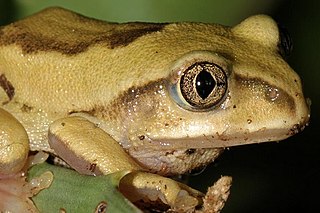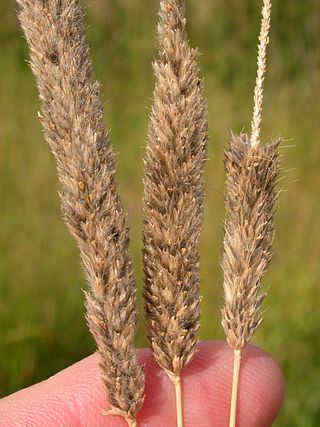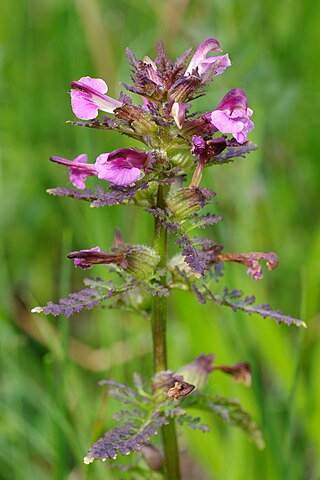
Timothy is an abundant perennial grass native to most of Europe except for the Mediterranean region. It is also known as timothy-grass, meadow cat's-tail or common cat's tail. It is a member of the genus Phleum, consisting of about 15 species of annual and perennial grasses.

Alopecurus pratensis, known as the meadow foxtail or the field meadow foxtail, is a perennial grass belonging to the grass family (Poaceae). It is native to Europe and Asia.

Alopecurus, or foxtail grass, is a common and widespread genus of plants in the grass family. It is common across temperate and subtropical parts of Eurasia, northern Africa, and the Americas, as well as naturalized in Australia and on various islands.

North Meadow, Cricklade is a hay meadow near the town of Cricklade, in Wiltshire, England. It is 24.6 hectares in size. It is a traditionally managed lowland hay-meadow, or lammas land, and is grazed in common between 12 August and 12 February each year, and cut for hay no earlier than 1 July. This pattern of land use and management has existed for many centuries and has resulted in the species rich grassland flora and fauna present on the site.
British NVC community MG13 is one of the mesotrophic grassland communities in the British National Vegetation Classification system. It is one of three types of mesotrophic grassland classified as grass-dominated inundation communities.
British NVC community MG4 is one of the mesotrophic grassland communities in the British National Vegetation Classification system. It is one of four such communities associated with well-drained permanent pastures and meadows.

The speckled reed warbler or streaked reed warbler is an Old World warbler in the family Acrocephalidae. The species was first described by Robert Swinhoe in 1863.

Normanbya is a monotypic genus of palms containing the single species Normanbya normanbyi, which is known by the common name black palm It is endemic to Queensland, Australia and is threatened by habitat destruction.

Wodyetia bifurcata, the foxtail palm, is a species of palm in the family Arecaceae, native to Queensland, Australia. It is the sole species in the genus Wodyetia.

Leptopelis mossambicus, the brown-backed tree frog, Mozambique tree frog or Mossambique forest treefrog, is a species of frog in the family Arthroleptidae found in Eswatini, Malawi, Mozambique, South Africa, Zimbabwe, and possibly Botswana. Its natural habitats are dry savanna, moist savanna, subtropical or tropical moist shrubland, subtropical or tropical dry lowland grasslands, subtropical or tropical seasonally wet or flooded lowland grasslands, swamps, freshwater marshes, and intermittent freshwater marshes. It is threatened by habitat loss.

The crowned bullfrog is a species of frog in the family Dicroglossidae. It is found in the Sub-Saharan Africa . Its natural habitats are subtropical or tropical moist lowland forest, dry savanna, moist savanna, subtropical or tropical dry shrubland, subtropical or tropical moist shrubland, subtropical or tropical dry lowland grassland, subtropical or tropical seasonally wet or flooded lowland grassland, rivers, intermittent rivers, freshwater lakes, intermittent freshwater lakes, freshwater marshes, intermittent freshwater marshes, freshwater springs, arable land, pastureland, rural gardens, heavily degraded former forest, and ponds.

Hydrocotyle vulgaris, the marsh pennywort, common pennywort, water naval, money plant, lucky plant or copper coin, is a small creeping aquatic perennial plant native to North Africa, Europe, the Caucasus and parts of the Levant.

Alopecurus aequalis is a common species of grass known as shortawn foxtail or orange foxtail. It is native to much of the temperate Northern Hemisphere from Eurasia to North America. It is most commonly found in areas near fresh water, such as the margins of ponds and ditches.

Alopecurus carolinianus is a species of grass known by the common names Carolina foxtail and tufted foxtail.

Alopecurus geniculatus is a species of grass known by the common name water foxtail or marsh foxtail. It is native to much of Eurasia and introduced into North America, South America, and Australia. It grows in moist areas.

Alopecurus saccatus is a species of grass known by the common name Pacific foxtail, or Pacific meadow foxtail.

Alopecurus arundinaceus, the creeping meadow foxtail or creeping foxtail, is a rhizomatous perennial species in the Grass family (Poaceae). Native to Eurasia and northern Africa, and widely introduced elsewhere, this sod forming grass is useful as a forage and for erosion control. It grows in damp or saline grasslands and banks of waterways, and on mountains up to 1,200 m. It flowers between April and July, depending on its location.

Severn Ham, Tewkesbury is a 70.82-hectare (175.0-acre) biological Site of Special Scientific Interest in Gloucestershire near Tewkesbury, notified in 1974.
Alopecurus setarioides is a species of foxtail grass that is found in France, Greece, Italy and Turkey. It prefers wet places, including ditches.

Pedicularis palustris, commonly known as marsh lousewort or red rattle, is a plant species in the family Orobanchaceae. It is native to central and northern Europe and Asia where it grows in wetlands and boggy habitats. The International Union for Conservation of Nature has assessed its conservation status as being of least concern.

















